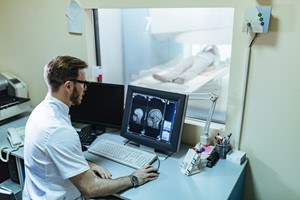NYC Health + Hospitals plans to upgrade hundreds of medical imaging technologies across the health system over the next 10 years as part of a $224 million deal with GE Healthcare.
The health system operates 470 imaging machines—including MRI, CT, nuclear cameras, X-ray machines, catheterization labs, PET/PETCT machines and fluoroscopy units—across its 11-hospital footprint. Half of those medical imaging units, about 230, will be replaced and updated within the first four years of the project, health system officials said.
NYC Health + Hospitals is the largest public healthcare system in the nation serving more than a million New Yorkers annually and operating 70 patient care locations in the city's five boroughs. The organization performs 1.5 million imaging procedures each year.
The technology upgrade is part of a broader effort to standardize technology at the health system, which has included deploying a $1 billion single, shared electronic health record (EHR) system from Epic and a single picture archiving and communication system.
The equipment upgrade supports the health system’s goal of standardizing care and providing patients modernized technology to produce faster and better image quality, leading to quicker diagnoses and treatment for patients.
“At NYC Health + Hospitals, we are making investments that will improve patient experience and provide the highest quality of care, diagnosis, and treatment for all New Yorkers,” said Mitchell Katz, M.D., president, and CEO of NYC Health + Hospitals. “We’re standardizing our technology to offer patients the same quality of care regardless of what facility they visit.”
The partnership with GE will also modernize and streamline the capital imaging equipment planning and replacement process, health system officials said.
“Providing premium care to a growing patient population continues to be challenging in today’s healthcare environment," said Everett Cunningham, president and CEO of GE Healthcare, U.S., and Canada.
"This relationship will provide both clinicians and patients access to the latest imaging technology while helping NYC Health + Hospitals meet its goals of reducing costs, increasing hospital efficiency, enhancing clinical quality, and improving patient experience," Cunningham said in a statement.
Of the total investment, $20 million has already been allocated for NYC Health + Hospitals/Coney Island, which is undergoing renovations as part of its Hurricane Sandy recovery project. The hospital will receive 47 new imaging technologies including ultrasounds, MRI machines and a variety of X-ray units.
The health system also is working on a financial turnaround. NYC Health + Hospitals announced Oct. 10 that it closed 65% of its $1.8 billion structural budget gap at the end of its fiscal 2019 through additional revenue, savings and managed care negotiations.
The public hospital system has made strides to increase revenue and decrease expenses. Overall, fiscal 2019 revenue is $62 million above target. Expenses closed at $24 million better than budget. The public health system closed the year with a $36 million net positive margin, according to health system officials.
Technology investments in a new EHR system have also yielded results, the health system said. The new Epic EHR has enabled better care coordination for patients while collecting revenue from insurance companies.
Market Overview
The global digital radiology market size reached US$ 4.2 Billion in 2021. Looking forward, IMARC Group expects the market to reach US$ 6.08 Billion by 2027, exhibiting a growth rate (CAGR) of 6.20% during 2022-2027.
Digital radiology (DR) is used to produce a digital radiographic image on a computer. It relies on x-ray sensitive plates to capture data during object examination and convert the incident x-ray radiation into an equivalent electric charge and a digital image through a detector sensor. It allows the acquisition, deletion, editing, and transferring of films while reducing noise, eliminating artifacts, and enhancing the contrast of images. It also helps transfer images to other computers for remote viewing and linking computers to digital record systems. As a result, it finds extensive applications in hospitals, diagnostic clinics, and dental care centers across the globe.
At present, the growing demand for digital radiology in clinical diagnosis due to the high-quality picture processing and less radiation exposure represents one of the key factors driving the market. In addition, key market players are extensively investing in research and development (R&D) activities to introduce enhanced technologies for increasing the contrast and sharpness of images while inspecting injuries in real-time. They are also focusing on developing advanced modalities, such as multimodal or hybrid imaging systems. Besides this, there is a rise in the prevalence of chronic diseases, such as cancer, diabetes, heart and Alzheimer's disease, stroke, and pulmonary conditions. This, along with the burgeoning healthcare industry, is contributing to the growth of the market. Moreover, the growing integration of artificial intelligence (AI) and cloud-based imaging in digital radiology solutions to improve diagnostic accuracy is offering a positive market outlook. Apart from this, the increasing demand for remote-controlled imaging devices that integrate fluoroscopy and radiography to improve clinical productivity and efficiency is propelling the growth of the market. Additionally, the rising awareness among the masses about using preventive healthcare and disease screening programs is bolstering the market growth.












